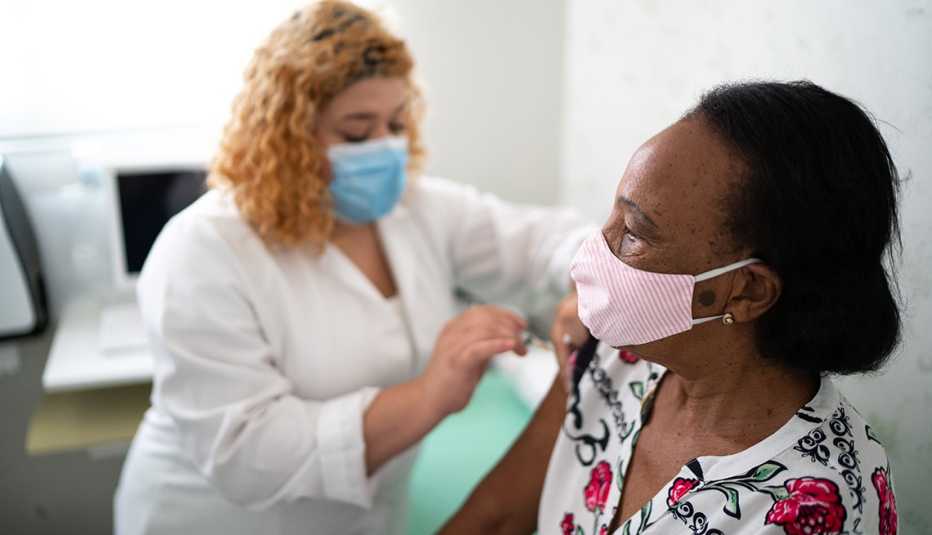AARP Hearing Center


As more people across the nation become eligible for COVID-19 vaccines, more employers are taking steps to urge their employees to get their shots. A number of businesses are paying their hourly employees for the time they would have to take off to get vaccinated or offering small stipends as an incentive to get the vaccine.
Generally, employers can require their workers to get vaccinated as a condition of keeping their jobs, with a few notable exemptions. As the nation continues to grapple with the COVID-19 pandemic, more employers are telling workers to either get vaccinated or submit to regular tests to prove they are not infected. Many companies also are looking for ways to make it easier for their workers to get shots.
For example, grocery stores, which were among the first businesses to implement COVID-19 safety measures such as mask requirements, are also the early leaders when it comes to offering to compensate their hourly workers for the time it takes to get vaccinated.
"Providing accommodations so employees can receive this critical vaccine is one more way we can support them and eliminate the need to choose between earning their wages and protecting their well-being,” said Jason Hart, CEO of ALDI U.S.
To be clear, most employers are currently not directly providing vaccinations to their employees. Workers have to make their own arrangements for COVID-19 shots, the same as other residents of their city or state. Also, working for one of these companies does not necessarily mean getting easier access to the vaccine, though vaccinations are now highly accessible in most parts of the nation. And while the financial support provided by employers could nudge workers who might otherwise be reluctant to sign up, many people have remained hesitant to get the shots.
In September, President Biden announced that all federal executive-branch employees and contractors would have to be vaccinated. He also announced that all private-sector employers with 100 workers or more will have to require their employees to either get vaccinated or take coronavirus-infection tests on a regular basis. These private businesses also will have to give their workers paid time off in order to get the shots.
Earlier this year, to encourage more small businesses to provide this benefit, the IRS is offering companies with fewer than 500 employees a tax credit to offset the cost of time workers use to get vaccinated.
Here are the employers that are now paying their workers to get vaccinated. Clicking on the name of the business will take you to an AARP Job Board page that shows current job openings at that company.
ALDI
This discount grocery chain, which has more than 2,000 stores across 37 states, is offering its hourly employees up to four hours of pay — two for each dose of the vaccine. Its salaried workers will receive flexible hours so they can be vaccinated.
American Airlines
This major international airline is offering its workers who get vaccinated one additional day of paid vacation in 2022 along with $50 in rewards points. “The vaccine can help build a safer, healthier American, and it’s an important part of the overall recovery from the pandemic,” American executives said in its announcement to the staff.
Amtrak
The national train service recently announced its goal to have all of its roughly 20,000 workers vaccinated for COVID-19. To encourage employees to get the shots, Amtrak is offering to pay them the equivalent of two hours of regular wages once they can show proof of vaccination. Amtrak also is allowing workers to take excused absences to recover from any side effects they might experience within 48 hours of receiving the shots.
Bolthouse Farms
Workers for this fresh-produce company can receive a $500 bonus once they are vaccinated, Bolthouse executives told The Wall Street Journal. The company currently employs more than 1,800 workers.





























































More on work
Coronavirus
Coronavirus News - COVID-19, Pandemic, Stimulus, Unemployment, Quarantine, Home Life, Nursing Homes, Caregiving, TechnologyCOVID-19 Spotlights Need to Expand Family Leave Policies
Report finds that benefit changes may determine whether many women stay in the workforce
Workers' Rights: What Your Boss Can and Can't Do During the Pandemic
EEOC, CDC rules for employers on temperature checks, working remotely, masks and more